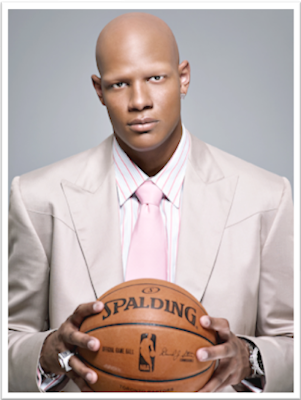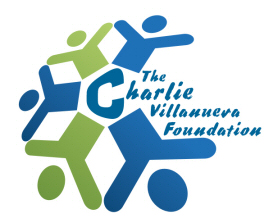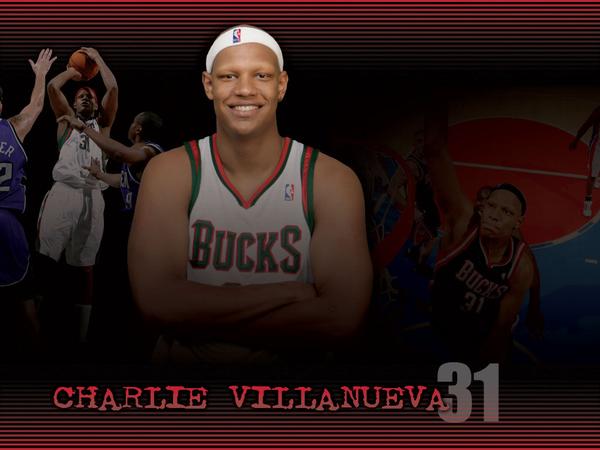You may know Charlie Villanueva for his famous half-time tweet, but the man behind the text message has the sports world in a twitter over his huge heart, as well as his basketball talent. The Dominican Republic native and forward for the NBA's Milwaukee Bucks is setting a magnificent example for philanthropy and charity in sports with The Charlie Villanueva Foundation (CVF).
Villanueva grew up in the tough neighborhood of Elmhurst in Queens, New York and is no stranger to the plight of the inner-cities. His childhood had its share of difficulties, from dealing with the neighborhood kids who sold drugs and committed various crimes to enduring an emotionally painful skin disorder known as alopecia, which caused him to lose his hair at age 12. With strong parents to guide him, Charlie Villanueva emerged from his youth with a resolve to never forget where he came from.
The Charlie Villanueva Foundation was started to empower young people to make the positive decisions that will ultimately culminate in the realization of their goals. Under the CVF umbrella, Villanueva has created programs such as "Charlie's Angels On The Road," where kids are invited to watch a pregame shootaround with their parents, and "Tenis Para Niños" (Sneakers for Kids), where over 10,000 pairs of shoes are donated each year to children in need in the Dominican Republic. He has also provided valuable resources and support to families with children affected by alopecia and works closely with the National Alopecia Areata Foundation. Villanueva has excelled in his determination to give something back. The NBA has taken notice, as Charlie is a two-time winner of the NBA Community Assist Award.
Recently, Charlie Villanueva sat down with Access Athletes, The Real Athlete Blog to discuss a variety of topics including The Charlie Villanueva Foundation. He was also able to answer questions about the player-agent relationship in sports at length. His answers will be an invaluable resource for any athlete who is preparing for or just beginning a professional career.
What comes across most strongly in the interview you are about to read is the authenticity of Villanueva. There is very little pretense about him. What you see is what you get, and he has dedicated himself to setting a higher standard for athletic philanthropy. In my opinion, there are few professional athletes like Villanueva, who display such a true devotion and genuine commitment to a charitable cause, and I hope that other professional athletes are inspired by his work. How many professional athletes do you know who refer to their charitable work as a right?
Julius Erving was once asked what he attributed his phenomenal success to and he responded that he had learned to demand more of himself than anyone could ever expect. It's obvious that Charlie Villanueva lives by the same principle.
The Charlie Villanueva Foundation
AA: What were some of the challenges you faced in establishing The Charlie Villanueva Foundation? Who assisted you in setting up CVF and laying the groundwork for what the foundation has become today?
CV31: My brothers helped me get most of the groundwork started back when I first got drafted. I had an idea and they helped me develop it into a reality. My accountant at Monarch Wealth & Business Management handled the actual 501(c)(3) paperwork.
AA: When I read your ESPN interview, I was truly inspired by your passion to give back to the community and to create positive initiatives such as "Charlie's Angels on the Road" and "Tenis Para Ninos." In the ESPN interview, you said, "You can't forget where you came from." How do you stay humble as an NBA star and continue down this path of giving back?
CV31: I don’t see giving back as a privilege or preference. It is my right and desire to do so. I guess it’s something that is built within my character thanks to my parents' upraising.
AA: How has your teen experience of dealing with other kids ridiculing you because of your skin condition shaped your outlook on both life and basketball?
CV31: It was a tough battle having to face my peers at schools and in the playgrounds on a daily basis without dealing with the controversy. It was hard and to me it was God’s blessing to provide me with the talent of basketball to help me overcome the adversity. Basketball was my tool to defeat the odds against me. I actually wrote a good, detailed story on my experience in a new book that was recently released called “Chicken Soup for the Soul Inside Basketball: 101 Great Hoop Stories from Players,” produced by Pat Williams, Sr. Vice President of the Orlando Magic. You guys should go check it out: www.chickensoup.com.
AA: How did you use basketball as a tool to overcome your condition? What advice would you give to young athletes who are troubled by their physical, emotional, or economic conditions on how to use sports to overcome their respective issues?
CV31: I’m a big believer that everything happens for a reason. So if you have something that the doctors say you can’t defeat, don’t look at it as a downfall, but look at it as a new opportunity to enhance another level of your life. Never stop believing in yourself. And don’t ever let ANYONE tell you that you can’t do something just because of a condition or physical inability. Believe in yourself at all times. That’s actually one of my slogans… “iBelieve” - all one word. I think the letter “i" should be added as one word in front of the “b”. You know the famous saying “There’s no I in TEAM.” Well, I always say… “There’s no BELIEVE without I.”
AA: How did it feel to become a two-time recipient of the NBA Community Assist Award in August?
CV31: It is always really nice to get recognized for your work, but to be honest, I don’t do it for the recognition. I do it because it is much needed and it is my right as a professional athlete.
AA: Any plans to team up with fellow Dominicano and NBA Community Assist Award recipient Al Horford to launch any charitable initiatives in the Dominican Republic?
CV31: It’s funny you mentioned that, because my brother is currently in communication with Al Horford’s people now to do something huge this summer. We may end up adding him in the efforts for Tenis Para Niños 2009, in order to make a bigger impact for those in need in our country of the Dominican Republic. Same goes with Francisco Garcia and some other players to be announced.
AA: Do you have any news or future plans with CVF that you would like to share with the athletes and readers of The Real Athlete Blog?
CV31: Hum, I just know that bigger and better things are to come. That’s the mission of these projects to maintain them, join forces with other organizations/partners, and make bigger impacts. So your volunteered support is always appreciated. The new Charlie Villanueva Foundation website, www.charlievillanueva.org is now online. So check it out and show us your love.
NBA Life
AA: What did you think about Michael Beasley’s decision to hire Bruce Shingler Jr. (a former administrative assistant at Kansas State who coached Beasley in AAU as a young teenager) to live with him and become his personal adviser for his rookie season? Is this something you did or considered doing during your first NBA season?
CV31: Well in my case, my older brother played that roll. It’s always important to have someone you trust be at your side. My brother has been living with me since my rookie year and is still here. He plays the middle man in all of my personal and business matters. It’s been very beneficial knowing you have someone you can trust that will always look out for your best interests. That’s real important.
AA: What advice could you offer to NBA rookies on adjusting to NBA life and being on the road all the time?
CV31: As a young man, you have to be mature about the position you’re in. I know it’s hard because for most guys, you practically become rich and famous overnight. There’s a lot of temptation out there, especially when you’re out traveling on the road, wanting to explore new cities… My advice is don’t get caught up, it will catch up to you, and it won’t be a pretty sight. I’ve learned from seeing others make the same mistake time after time. Don’t get caught up with the lifestyle, it is only your profession. You dictate how you live your own personal life. You are the NBA Player; the NBA Player is not you. So stay focused and in control of your personal surroundings.
Player-Agent Relationship
AA: When you were touted as a top-10 pick for the 2005 NBA Draft, describe what the agent selection process was like for you? Who helped you make your final selection? What were some of the qualities you looked for in your future agent? How informed were you about the agent selection process?
CV31: My family had some influence in my agent decision-making, especially my older brothers. We sat down and interviewed at least 6-7 candidates before making a decision. You have to look for a number of things when selecting an agent, such as: years of experience, current clientele, NBA leverage, any previous legal issues, relationships with team owners and management, being a licensed attorney also helps, etc. Things like that are all important. But I think most of all, it comes down to comfort level. You have to be comfortable enough to be able to talk to your agent about ANYTHING. It’s like you have to give him the same respect you would give your dad. Your agent, especially during your rookie year, becomes a father figure relationship.
AA: How would you describe your relationship with your agent, Jeff Schwartz?
CV31: It’s interesting because Jeff wasn’t my first agent. Billy Ceisler of Essential Sports was my first agent. I terminated Billy’s services a few months after I was traded to Milwaukee. I had a great personal relationship with Billy; he was a good friend, but he didn’t have the respect level and support system from his business peers. It was like he became more of my boy than my agent. I lost the comfort. And in this business, there’s a lot of politics. I was going to sign with Jeff Schwartz from the beginning, but it didn’t work out due to the basketball politics. But things have a way of coming around, and going back to your question… I have a great relationship with Jeff and more than that with the Excel Sports Management group. It’s like you become a part of a family instantly and you know you have people you can depend on at all times. It makes you sleep better at night. Jeff is very well-respected and experienced, an agent that has proven himself in a business filled with sharks. I couldn’t find a bad thing to say about Jeff, and I did my extensive homework thanks to my brothers and others, so I hired him.
AA: With such a large roster of notable clients, how personalized is Mr. Schwartz’s representation? Do you deal with him most of the time or with other employees at Excel Sports Management?
CV31: I deal with Jeff directly. There’s another agent in the group named Sam Goldfeder, which he’s real cool too. But if you sign with Jeff, you get Jeff directly. If you signed with Sam, you get Sam. It all depends. Jeff has a great quality of clientele overall, but he manages his time accordingly unlike others, and he’s able to give me the full attention I need when I need it. That’s important.
AA: What sort of improprieties have you encountered as a top high school and college player in terms of representatives soliciting you as a prospective client?
CV31: In this business you get constant solicitation from known runners to your average Joe hoping to get a deal. It’s a part of business. It’s the entertainment industry, nothing new. You get offered the typical things such as clothing, sneakers, video games, cash is always popular, etc. But just because you are surrounded by it or being offered it, doesn’t mean you need to accept it and get involved. As a young player, your only worry should be basketball.
AA: What do you think could be done to improve the issues with runners and agents committing violations and trying to sway players to their corners starting on the AAU scene?
CV31: That’s like asking how do we take drugs off the street, maaan. Hum, I really don’t think something could be done; this is something that will always exists. Yet, it starts with yourself. It is up to the individual to avoid the influence and distractions. Don’t blame the game, blame the player. It’s easier said than done.
AA: Do you hear some of your teammates or friends in the NBA complaining about the quality of their agent representation?
CV31: Guys don’t really talk about their representation to one another unless something seriously goes wrong. For the most part, guys are typically comfortable on where they’re at in terms of representation, until something happens.
AA: Do you think there is a need for an independent 3rd party service to advise NBA players on selecting an agent?
CV31: Nah, that is something one should learn and educate themselves on. Doing it on their own is the best way. No need for a 3rd party service. That may leave an opening to create another level of corruption.
A Few Last Questions for Charlie V.
AA: What do you think about Brandon Jennings' decision to jump to Europe and attempt to create a unique path to make it to the NBA?
CV31: Man, that was a big gamble by Brandon Jennings. I personally think college would have been the much safer and much more fun route. The college experience is super great. I would recommend it to anyone. I’m glad I did it. I had my name on the 2003 NBA Draft coming out of high school, but I pulled out to attend the University of Connecticut; we won the championship in my first year there. It was an incredible journey. But I understand sometimes college isn’t an option and what Jennings did is risky, but you have to give him props for taking that chance. He may end up becoming a revolutionary trendsetter. If it works out, I could see more and more kids taking that route, but to be honest, I just don’t think it’s worth the risk. Go to school, at least you can have a great Plan B to lean on if the basketball thing doesn’t work out. I wish him the best of blessings and success. I think he’s going to be alright regardless. God always has a plan.
AA: What is the best thing that has happened to you since becoming an NBA player?
CV31: The best thing for me was the financial benefit to take care of my mother and family. The first thing I did when I got my first check was take my mother out the hood and I purchased her a house in a much better neighborhood. It’s a blessing to even be able to say that now. I’m really thankful and grateful God has blessed me and my family with the opportunities the NBA delivers.
The Official Website of Charlie Villanueva, www.CV31.com
Charlie V.'s Official Twitter Page, http://twitter.com/cv31
On behalf of Access Athletes, we would like to thank Charlie Villanueva for taking time out of his busy schedule to do an interview with The Real Athlete Blog. If you have any questions about The Charlie Villanueva Foundation or you would like to volunteer, please contact Matthew Allinson at matt@accessathletes.com.





Sal Sanchez
05-27-2009Great Interview, Matt! It's refreshing to hear a pro-player talk about the challenges a player faces when choosing an agent. A lot of times all you hear about is the player, agent, and amount the player signed for' it's nice to hear about something other that the $.
Comments Closed
yolanda
03-27-2012My grandson and I would love to meet you!!!!!
Comments Closed